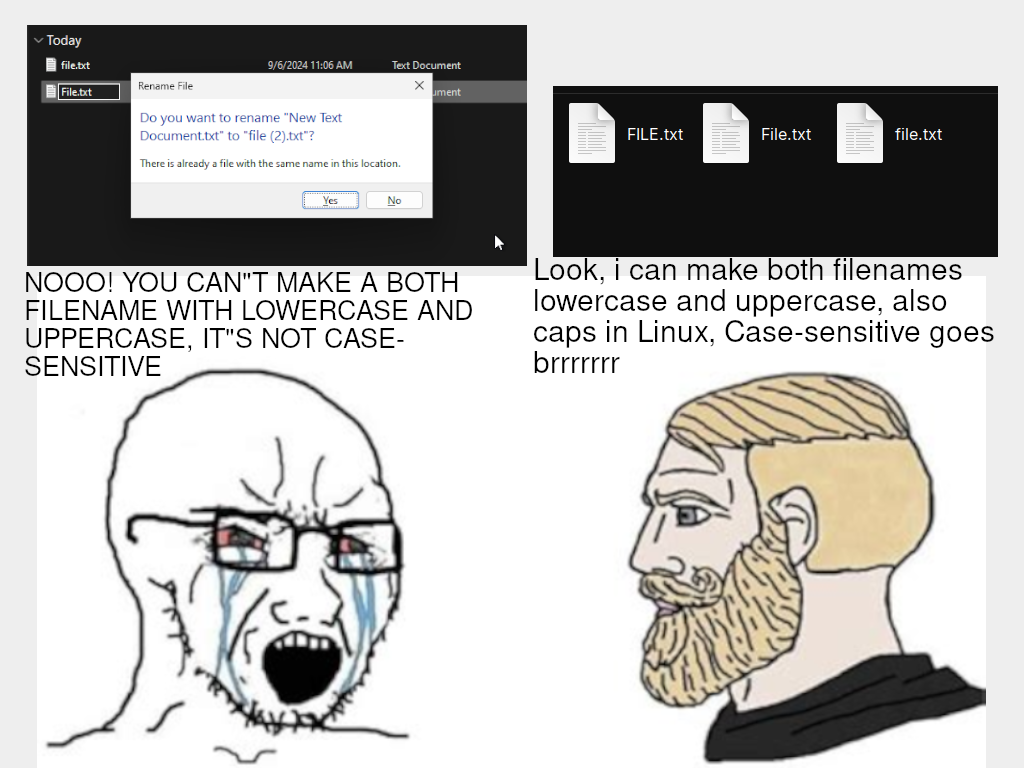this post was submitted on 06 Sep 2024
614 points (90.4% liked)
linuxmemes
23315 readers
374 users here now
Hint: :q!
Sister communities:
Community rules (click to expand)
1. Follow the site-wide rules
- Instance-wide TOS: https://legal.lemmy.world/tos/
- Lemmy code of conduct: https://join-lemmy.org/docs/code_of_conduct.html
2. Be civil
- Understand the difference between a joke and an insult.
- Do not harrass or attack users for any reason. This includes using blanket terms, like "every user of thing".
- Don't get baited into back-and-forth insults. We are not animals.
- Leave remarks of "peasantry" to the PCMR community. If you dislike an OS/service/application, attack the thing you dislike, not the individuals who use it. Some people may not have a choice.
- Bigotry will not be tolerated.
3. Post Linux-related content
- Including Unix and BSD.
- Non-Linux content is acceptable as long as it makes a reference to Linux. For example, the poorly made mockery of
sudoin Windows. - No porn. Even if you watch it on a Linux machine.
4. No recent reposts
- Everybody uses Arch btw, can't quit Vim, <loves/tolerates/hates> systemd, and wants to interject for a moment. You can stop now.
5. 🇬🇧 Language/язык/Sprache
- This is primarily an English-speaking community. 🇬🇧🇦🇺🇺🇸
- Comments written in other languages are allowed.
- The substance of a post should be comprehensible for people who only speak English.
- Titles and post bodies written in other languages will be allowed, but only as long as the above rule is observed.
6. (NEW!) Regarding public figures
We all have our opinions, and certain public figures can be divisive. Keep in mind that this is a community for memes and light-hearted fun, not for airing grievances or leveling accusations. - Keep discussions polite and free of disparagement.
- We are never in possession of all of the facts. Defamatory comments will not be tolerated.
- Discussions that get too heated will be locked and offending comments removed.
Please report posts and comments that break these rules!
Important: never execute code or follow advice that you don't understand or can't verify, especially here. The word of the day is credibility. This is a meme community -- even the most helpful comments might just be shitposts that can damage your system. Be aware, be smart, don't remove France.
founded 2 years ago
MODERATORS
you are viewing a single comment's thread
view the rest of the comments
view the rest of the comments

It's neat that Linux has the ability to do this, but I honestly can't think of a good usecase for this. I think this is more confusing than it is useful
Git likes to have a word with you.
Command 'Git' not found
Beautiful
Huh, what makes this a use case in favor of case sensitive file names? How does git use this feature?
Create multiple branches that only differ in cases from a Unix OS so it breaks git for Windows users in the same project.
We had a repo with some really weird (filename) case issues on Mac also. I could only fix it on my home Linux machine, by deleting all the affected files, committing that, then restoring them with all lowercase names. Only time I've dealt with that in 20 years but it can happen!
I feel the same way about programming languages. There is no way that "User" and "user" should refer to different variables. How many times has that screwed people up, especially in a weekly typed language?
One of the many things that I feel modern versions of Pascal got right.
Nope. Completely different.
Case is often used to distinguish scope. Lowercase is local while uppercase is public. "Name = name" is a pretty standard convention, especially in constructors.
There is a ubiquitous use case in programming. There is not in the file system.
My point is not about how case is meant to be used my point is that it is very easy to make a mistake that is difficult to spot. I think it makes a lot more sense to the case insensitive, and force different names to be used.
This is the first time I've seen uppercase denoting scope. Usually it is done with a "_" or "__" prefix.
Casing styles usually mean different identifier types.
snake_case or pascalCase for functions and variables, CamelCase for types, UPPER_SNAKE_CASE for constants, and so on.
If we want to apply this to file systems, you could argue something like: CamelCase for directories, snake_case for files, pascalCase for symlinks, UPPER_SNAKE_CASE for hidden files.
My naming convention for C++ is that custom types are capitalized and instances aren't. So I might write
User user;.It's quite useful for stuff like PROGRAM and Program in the same directory where PROGRAM is the program itself and Program is some unrelated files about the program. Bad example, but the case stands.
So what you're telling me is that it's useful when the software you use is made by absolute idiots?
It's not about software. Program, PROGRAM were just placeholders for content. I know you can think more abstract and argue in better faith than this.
Replace 'software' by w/et placeholder thing
I think if you can write them in two different ways it should consider them two different things